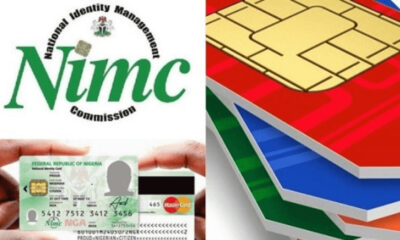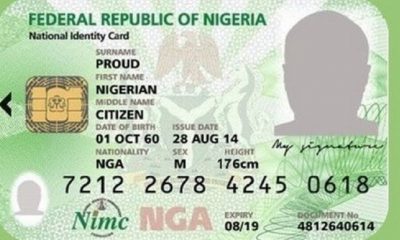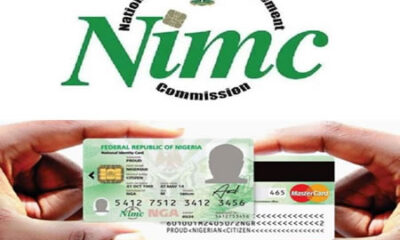News
Again, FG Shifts Deadline for NIN Verification to July 26

Following the slow verification of the National Identification Number (NIN) by the Identity Management Commission (NIMC) the federal government yesterday extended the deadline for NIN-SIM data verification from June 30 to July 26.
Yesterday’s extension of the deadline made it the seventh time the federal government would be postponing the deadline, since the beginning of the exercise.
The federal government has equally increased facilities for the registration of NIN to 5,410 nationwide.
In a joint statement yesterday by the Nigerian Communications Commission (NCC) and the National Identity Management Commission (NIMC), and signed by the Director of Public Affairs at NCC, Dr. Ikechukwu Adinde, and the Head, Corporate Communications at NIMC, Mr. Kayode Adegoke, stated that the decision to extend the deadline was made after a request by stakeholders on the need to consolidate the enrolment and NIN-SIM verification process following the rapid increase in the number of enrolment systems nationwide.
The federal government, in December 2020, had directed telecoms subscribers to register their NIN and submit same to network operators for verification and linkage with their SIM cards.
However, the Joint Implementation Committee (JIC) on harmonisation of National Identification Number (NIN) with Subscriber Identification Module (SIM), otherwise known as NIN-SIM Harmonisation Committee, has rated NIN-SIM verification and integration exercise very low for May .
The committee’s latest report on NIN submission and verification, covering March to May, showed that subscribers have continued to submit their NINs to mobile network operators (MNOs) for verification and linkage to their telephone lines, as directed by the federal government.
The information gathered, however, showed that the verification and linkage has been abysmally slow, due to the alleged poor funding of NIMC, the government agency, responsible for NIN enrolment and verification.
According to the committee’s report, active telephone lines as of May were 192 million, and a cumulative 95.6 million NIN owners submitted their NIN in the same month. But only 1.3 million NINs were verified and linked during the review period.
A breakdown of the statistics showed that in March, active telephone lines were 196 million, but the number dropped to 192.4 million in April and further dropped to 192.1 million in May 2021. The number of subscribers that submitted their NINs through the networks of MNOs was 90.35 million in March, representing 46 per cent of the total number of subscribers.
The figure increased to 90.38 million in April, representing 47 per cent and further increased to 95.6 million in May, representing 49.7 per cent.
From the total number of NIN submitted, only 588,010, were verified and linked in March 2021, representing 0.6 per cent, only 929,846 were verified and linked in April, representing one per cent, while only 1.3 million NINs were verified and linked in May, representing 1.4 per cent of the total number of submitted NINs.
Total NIN enrolment by MNOs in March was 210,487 with 123,379 generated NINs.
In April, it rose to 413,272 NIN enrolments with 234,499 generated NINs. In May, the figure rose again to 530,893 NIN enrolments with 335,193 generated NINs.
But from March to May, the total NIN enrolments by all NIMC partners, were two million in March, three million in April, and two million in May.
The total NIN penetration, which is the number of NINs successfully linked, was put at 51 million in March, representing 24.1 per cent of Nigeria’s population of 211.4 million, 54 million in April, representing 25.5 per cent of the population, and 56 million in May, representing 27 per cent of the population.
When asked to comment on the low verification figure, both NIMC and NCC declined to comment, but a source close to NIMC said: “The figures are correct but NIMC cannot comment because NIMC is not involved in NIN-SIM linkage, even though NIMC verifies all registered NINs from its back end server.”
NIMC is of the view that the issue of incomplete and inappropriate SIM registration on the network of MNOs, could be responsible for slow NIN-SIM integration, but the Joint Implementation Committee thinks otherwise, blaming the situation of slow verification on poor funding of NIMC, resulting in the inability of NIMC to implement the recommended Bulk NIN Verification process that would speed up NIN verification and integration.
The committee said NIN verification and linkage by MNOs remained meagre at 0.6-1.4 per cent from March through May 2021, in comparison to 46-49.7 per cent of the national telecommunications base that submitted NINs over the period.
It stated that the trend will continue as long as bulk NIN Verification by NIMC is not in place.
The committee’s report said: “It is pertinent to mention that Bulk NIN Verification is still at the Proof-of-Concept (POC) stage since January 2021. NIMC needs to confirm a timeline when Bulk NIN Verification will commence. Without this, MNOs will continue to collect submitted NINs from customers but will not be able to verify and link them to customer’s telephone lines, as required, to achieve the stated objectives of the government. Without Bulk NIN Verification, MNOs would have to resort to overnight Batch NIN Verification processing using the Single NIN Verification API or otherwise invite their customers to visit MNO outlets for Individual NIN verification using the same API. NIMC’s systems would become overwhelmed by the millions of requests for overnight Batch NIN Verification processing from all MNOs leading to poor performance outright failure of the processing systems.”
The committee called on NIMC to take urgent action to rollout Bulk NIN Verification, without which verification of the 95.6m submitted telephone lines, which would continue to grow monthly, cannot happen and government’s directive to verify and link NINs to customer SIMs will not be achieved.
The Minister of Communications and Digital Economy, Dr. Isa Ibrahim Pantami, had in December 2020, issued a directive through NCC, for all telecoms subscribers to register their NIN and submit same for to their network operators for verification and linkage.
The initial directive had two weeks window to complete the NIN registration and verification, with a threat to deactivate the SIM of any subscriber who failed to comply within the stipulated period.
The deadline was later extended and since then, government has continued to extend it.
News
Executive Secretary FCDA Hadi Ahmad suspended indefinitely

Executive Secretary FCDA Hadi Ahmad suspended indefinitely
Executive Secretary, Federal Capital Development Authority FCDA, Engr. Shehu Hadi Ahmad, has been suspended indefinitely.
His suspicion was on the order of the Minister of the Federal Capital Territory, Nyesom Wike.
Senior Special Assistant on Public Communications and New Media to the Minister, Lere Olayinka, disclosed this in a statement on Thursday evening.
No reason was given for the suspension.
Ahmad was directed to hand over to the Director, Engineering Services in the FCDA.
The statement read: “The Executive Secretary, Federal Capital Development Authority FCDA, Engr. Shehu Hadi Ahmad, has been suspended indefinitely.
“According to a statement on Thursday, by Lere Olayinka, Senior Special Assistant on Public Communications and New Media to the Minister of Federal Capital Territory FCT, Nyesom Wike, the suspension of Engr Hadi Ahmad is with immediate effect.
“The suspended Executive Secretary has consequently been directed to hand over to the Director of Engineering Services, Engr in the FCDA.”
News
Just in: Rivers, Anambra high court judges suspended for one year

Just in: Rivers, Anambra high court judges suspended for one year
The National Judicial Council (NJC) has suspended two state high court for over acts of professional misconduct.
The NJC named the affected judges as Justice G. C Aguma of the High Court of Rivers State and Justice A.O Nwabunike of the Anambra State High Court.
They were both suspended for the period of one year without pay and thereafter placed on watch list for two years.
The decision was taken at the 107th Meeting of the NJC chaired by the Chief Justice of Nigeria, Hon. Justice Kudirat Kekere-Ekun on 13 and 14 November 2024.
A total of five serving judicial officers were sanctioned for various acts of misconduct.
The Council also recommended two Heads of Court for compulsory retirement over falsification of age.
The duo of the Chief Judge of Imo State, Hon. Justice T. E. Chukwuemeka Chikeka and the Grand Kadi of Yobe State, Hon. Kadi Babagana Mahdi, were recommended for compulsory retirement for falsification of their ages.
The Council considered the Report of its Preliminary Complaints Assessment Committee, which considered a total number of 30 petitions, empanelled six committees for further investigation.
Twenty-two cases were dismissed for lacking in merit, two were sub judice.
The Council also empanelled a committee to investigate all complaints and petitions against Hon. Justice O. A. Ojo, Chief Judge, Osun State.
News
FG announces plans to borrow N13.8tn for 2025 budget

FG announces plans to borrow N13.8tn for 2025 budget
ABUJA—THE Federal Executive Council (FEC) yesterday approved a budget proposal of N47.9 trillion for the 2025 fiscal year and borrowing of N13.8 trillion.
The Minister of Budget and Economic Planning, Atiku Bagudu, disclosed this while briefing State House correspondents, at the end of the Council meeting, presided over by President Bola Tinubu at the Presidential Villa, Abuja.
The approval is part of the Medium Term Expenditure Framework, MTEF, and Fiscal Strategy Paper, for 2025-2027, by the Fiscal Responsibility Act of 2007.
The framework is expected to be submitted to the National Assembly as required by law, either on Friday or Monday.
Bagudu outlined several key parameters that will guide the 2025 budget based on economic projections and government priorities. These include a projected Gross Domestic Product (GDP) growth rate of 4.6% for 2025, an oil price benchmark of $75 per barrel and an exchange rate of N1.400 to $1.
Additionally, the government anticipates oil production at 2.06 million barrels per day.
In terms of fiscal strategy, the budget assumes that the government will borrow approximately N13.8 trillion — about 3.87% of the GDP — to fund key infrastructure projects and economic initiatives.
Bagudu emphasized that this borrowing is part of a strategic plan to balance government spending with sustainable debt management.
The Minister further noted that “the Nigerian economy is showing signs of resilience, with a 3.19% growth rate recorded in the second quarter of 2024.
READ ALSO:
- We didn’t arrest Hamdiyya Sidi for criticising Sokoto governor – Police
- Four varsity lecturers dismissed for sexual misconduct
- Super Eagles seal AFCON 2025 spot, draw 1-1 against Benin
This growth is expected to continue through 2025, driven by efforts to tackle inflation and stabilize key economic sectors.”
Bagudu lists the aims of fiscal policies
He stressed that the Federal Government’s fiscal policies are aimed at strengthening economic resilience, continuing to address inflationary pressures, and providing more targeted support to drive long-term growth.
Bagudu also highlighted that the implementation of the 2024 budget was progressing well, with significant improvements in revenue collection and expenditure management, despite some delays in achieving pro-rated targets.
“Non-oil revenue streams, in particular, have performed better than initially expected, showing promising progress.
The N47.9 trillion proposed budget for 2025 includes various provisions, particularly in areas such as infrastructure development, social programs, and critical national projects.
Bagudu also revealed that for the first time, the government’s budget will include contributions to the development commissions that had recently been passed or were in the process of being passed by the National Assembly.
“These measures are designed to strengthen the country’s social and economic development at the grassroots level.”
He further noted that the federal government is committed to ensuring that the 2025 budget is passed and signed into law before December 2024, in order to create a predictable fiscal environment and adhere to the January-December budget circle that the administration aims to implement moving forward.
In addition to approving the 2025 budget, the FEC also endorsed the 2025-2027 Medium Term Expenditure Framework, MTEF, and Fiscal Strategy Papers, FSP, which outline the government’s long-term fiscal policies and strategies for achieving sustainable growth.
These documents will now be sent to the National Assembly for further review.
Bagudu emphasized that the MTEF and FSP provided the necessary roadmap for the government’s fiscal policy over the next three years, ensuring that public finances remained on a sound footing and that economic growth targets were met.
He expressed confidence that Nigeria’s economic trajectory was moving in the right direction, with positive growth recorded in key sectors.
He stressed that the government’s macroeconomic policies, particularly in the areas of market-driven pricing for petroleum products and foreign exchange, are contributing to the country’s overall economic stability.
“The fiscal efforts are on track, and we are confident that with these strategic investments and reforms, Nigeria will continue to make progress toward a more resilient and sustainable economy,” he declared.
Experts fault govt’s budget assumptions
Economy experts who spoke to Vanguard, however, faulted the budget assumptions, describing some of them as too aggressive.
In his comment, David Adonri, Analyst and Executive Vice Chairman at Highcap Securities Limited said : “One thing that bothers me is the failure of FGN to attach a report of the performance of the previous budget while seeking for approval of the new budget.
“Historical antecedents will let us know whether the assumptions underlying the new budget are reasonable.
“How will FGN finance the budget? Is it still a deficit budget like on previous occasions? There is nothing on ground to indicate that GDP growth rate of 4.6% is attainable in 2025.
“The omission of the forecast for inflation is questionable because the intended GDP growth may just be an inflationary growth which is akin to motion without movement.
“With Donald Trump’s agenda to release more fossil fuel from 2025, the crude oil price forecast may be misleading.
‘Finally, predicating the budget on a crude oil-driven economy shows that budgeting by FGN has not departed from past ruinous economic philosophy.
“It is too pedestrian for a country that should be inward-looking and focused on the mobilization of the idle factors of production in the country.”
On his part, Tunde Abidoye, Head of Equity Research FBNQest Securities Limited, said: “I think that some of the assumptions are a bit aggressive.
“The oil production benchmark of 2.06mbpd looks very ambitious given the current realized oil production level of around 1.3mbpd (ex-condensates), per NUPRC data.
“The exchange rate and GDP growth rate projections are also a bit optimistic given the current exchange rate is N1,650, and the strain on household wallets.
“However, although I think the oil price benchmark is realistic, there are potential downside risks arising from the anticipated ramp up of oil production by the US following President Trump’s victory at the polls.”
Also commenting, Clifford Egbomeade, Public Affairs Analyst/ Communications Expert, said: “The proposed 2025 budget of N47.9 trillion, based on a $75 oil benchmark, 2.06 mbd production, and 4.6% GDP growth, sets ambitious targets given Nigeria’s economic climate.
“The oil production target assumes steady output levels, which may be impacted by infrastructure limitations. Moreso, the projected 4.6% GDP growth may be optimistic, as Nigeria continues to face high inflation, currency pressures, and unemployment.
“The budget includes N9.22 trillion in new borrowing, raising concerns about fiscal sustainability given the nation’s current debt servicing load. “The assumed exchange rate of N1,400 per dollar suggests continued devaluation, which could intensify inflationary pressures. Achieving this budget will require effective fiscal reforms and greater economic diversification to meet revenue and growth targets.”
Dissecting the proposed budget, Port Harcourt-based energy analyst, Dr. Bala Zakka, said: “Oil market is very volatile and absolute caution should be taken in the process of taking the benchmark price for the 2025 budget.”
On output, he said: “The federal government said it is currently producing 1.8 million barrels per day, including condensate. Like in the case of price, adequate caution should also be taken here. I strongly believe that stakeholders, including the government and investors should work harder to further increase the nation’s capacity to produce oil and gas.”
“The Gross Domestic Product, GDP, is all about the production of goods and services in an economy. With constant power supply disruptions, it has not been possible for households and businesses to participate in the economy. It is very doubtful if they will be able to increase investment to produce goods and services in 2025.”
FG announces plans to borrow N13.8tn for 2025 budget
-

 Sports18 hours ago
Sports18 hours agoBREAKING: Super Eagles qualify for AFCON 2025
-

 Aviation20 hours ago
Aviation20 hours agoDisaster averted as bird strike hits Abuja-Lagos Air Peace flight
-

 Railway3 days ago
Railway3 days agoNigerian railway adds extra train to Friday, Saturday trips on Lagos-Ibadan route
-

 International3 days ago
International3 days agoUK announces 45,000 seasonal worker visas for 2025
-

 Education2 days ago
Education2 days ago12-year-old Nigerian girl Eniola Shokunbi invents air filter to reduce spread of diseases in US schools
-

 metro5 hours ago
metro5 hours agoCourt orders varsity to pay lecturer N40m compensation for wrongful dismissal
-

 Business3 days ago
Business3 days agoTop 5 crypto apps that work with Nigerian Bank accounts
-

 Politics2 days ago
Politics2 days agoWhy I can’t form coalition with Peter Obi – Sowore










